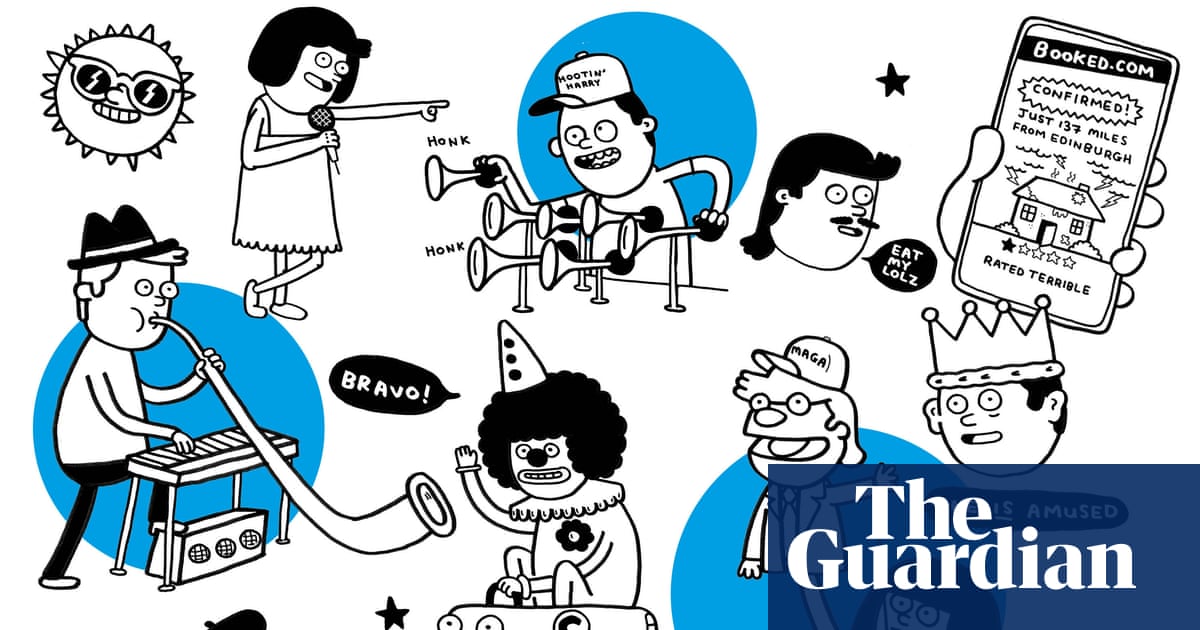I received my autism diagnosis about a decade into my career as a comedian and about three decades into being alive. In the eyes of some of the frothier comment section trolls, being a comedian means that I can’t be autistic, despite the likes of Fern Brady and Stewart Lee proving otherwise. This is because people are keener on stereotypes than admitting they know nothing about autism – why is the general level of knowledge so poor?
With Elon Musk and Robert F Kennedy Jr doing their best to make autism terrifying again, either by implying that it causes sieg heiling or by bringing back the MMR autism panic of the 1990s (along with actual measles), it struck me that we autistic people don’t have a lot of reliable representation to fall back on. There’s Rain Man, of course, and Ben Affleck in The Accountant, where he plays a sort of autistic accountant assassin and … that’s it. Neither depiction is hugely informative or accurate, though I suppose the assassin stuff could ward off some of the more gullible bullies.
What we have instead are characters who are “autistic-coded”. If you haven’t come across the term “coded” or “coding”, it describes when a character very clearly has a particular quality or basis that is never made explicit. Take the wildlings from Game of Thrones: they’re obsessed with freedom, are often ginger and live north of a big wall. George RR Martin could claim he wasn’t inspired by the Scottish until he was woad-blue in the face but we’d all be confident enough in our interpretation to ignore him, because the inspiration is obvious. How about Peter Mannion from The Thick of It? No one ever stated he was a Tory MP but then they didn’t have to! He was a posh, old, white chap in a suit who did classics at university. Of course, there were posh, old, white chaps in suits who did classics at university and who spied for the Soviet Union, so it’s not guaranteed but … come on. Coding doesn’t need to be perfect. It’s a cartoon not a portrait. It works exactly the same way with autistic-coded characters – if you are autistic or understand autism, they stick out a mile.

The good news is that autistic-coded characters are very popular. If your script needs an icy, savant-like genius with amusingly blunt dialogue and a monotonous voice we have you covered – think Benedict Cumberbatch’s Sherlock or Will Graham from the Hannibal series. Autistic-coded characters also pop up in comedies. Consider Sheldon from The Big Bang Theory and Dwight from the US remake of The Office. Sheldon struggles to read social situations, has special interests, rigid routines and issues with physical touch. Dwight, meanwhile, is rules-obsessed, bluntly spoken, wears the same clothes every day and gets upset when people touch his possessions. So far, so obvious.
When it comes to female characters, autistic-coding is perfect for engineering a manic pixie dream girl without any of the complications of a diagnosis. Amélie (from the film of the same name) is patient zero for 00s quirk and is widely viewed as autistic-coded. She adopts self-stimulatory behaviour (known as stimming), preferring feeling grains of wheat to sex; she struggles with social situations she has not planned carefully in advance; and she is described as having retreated into her own imagination. Eugen Bleuler, who coined the term autism in 1911, described the condition as “a withdrawal from reality”. Neither statement accurately describes autism, but in the case of TV and film, accuracy is rarely the goal.
Am I claiming that these writers are deliberately smuggling autistic people into their work? No. Autistic-coding can be accidental. Dan Harmon didn’t intend for Abed Nadir’s character in his sitcom Community to be autistic but, on hearing from autistic fans that they recognised themselves in Abed, Harmon did some research on autism to ensure he depicted it correctly – and discovered he had it too. Tim Burton wrote Edward Scissorhands as a gullible loner who suffers when his desire to please people leads to a misunderstanding and he has a meltdown. While Tim Burton does not have an official diagnosis, he has said he personally identifies with autism. (Regardless, the moral of Edward Scissorhands for autistic people is clear: you might be right not to leave the house – these people are crazy!) While these are examples of an artist’s true self emerging through their work, other creatives deny their autistic-coded characters out of fear.
Thanks to mental health awareness it is now almost impossible to write a comedy character who is amusingly bizarre without accidentally making the audience worried they might have a condition. The autistic-coded character must remain an enigma. Sheldon’s demand to always sit in the same place on his couch needs to be merely annoying. If Sheldon were diagnosed, it could change how his friends respond to him. It could destroy the show.

Faced with this fate, is it any wonder that shows avoid having the social responsibility of an autistic main character? To his great credit, Jim Parsons, who plays Sheldon, said in 2008 that his character “couldn’t display more facets of [autism]” – but presumably that interview was followed by a swift bonk on the nose, as the franchise has remained silent on Sheldon’s autism since. (The show’s writers have said that Sheldon’s character was not conceived of as autistic: “A lot of people see various things in him and make the connections”, Bill Prady, co-creator of The Big Bang Theory, said in 2009.)
I have to admit that I have sympathy for these writers. I’m a comedy writer myself and you can’t please everyone – even as an autistic person, my observations and jokes won’t accurately represent every autistic experience. Given that, is it any wonder that no one will step up?
after newsletter promotion
Moreover, you might ask, if these characters are so obviously autistic-coded why do we even need the writers to confirm it? If the coding is blatant enough, doesn’t that almost count as representation? Unfortunately, as long as the characters are merely coded and not diagnosed, the writers have no responsibility to try to get autism “right”. They can keep spreading damaging tropes and, by denying that seemingly autistic characters are autistic, they are putting off real undiagnosed autistic people from pursuing a diagnosis and living a better life. Why go through the fuss? You’re not autistic, you’re just like Sheldon! You’re just intriguingly quirky like Amélie!
Unfortunately, I think we can’t afford to make the perfect the enemy of the good. These writers deny that their characters are autistic because they have a reasonable fear that they’d spend their entire career fending off accusations of stereotyping and ableism instead of being left to be funny. While it’s up to them to admit that their characters are autistic, maybe it’s up to us, when they do so, to admit that even the most flawed representation of an autistic person is still progress of a sort.
You might scoff at how willing I am to take whatever crumbs I might get, but when people are letting children die of preventable diseases out of fear of autism and the mainstream press promotes fake “cures” for autism instead of information that might actually help worried parents or vulnerable children … well, we need all the awareness we can get.
Pierre Novellie’s memoir, Why Can’t I Just Enjoy Things?, is out now in paperback.

 3 months ago
88
3 months ago
88

















































